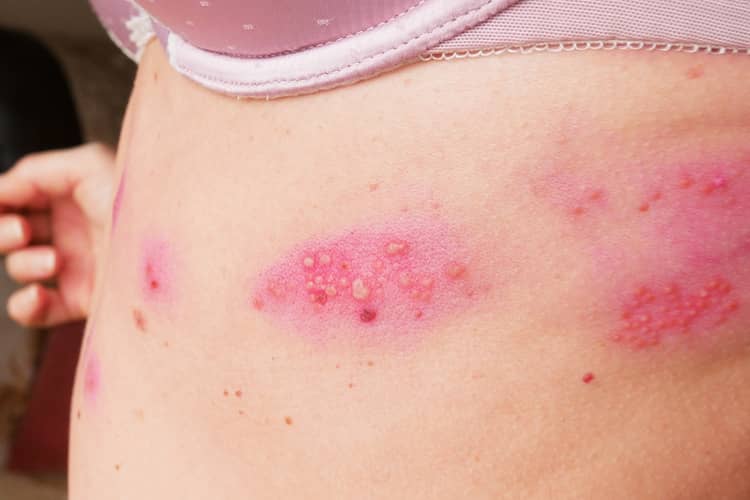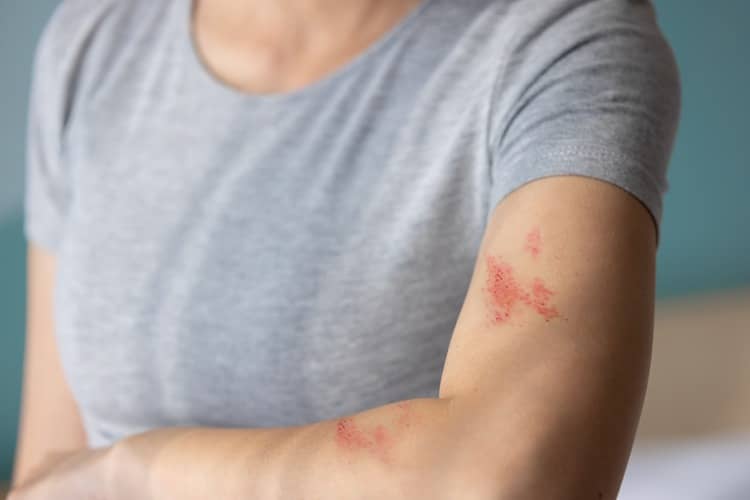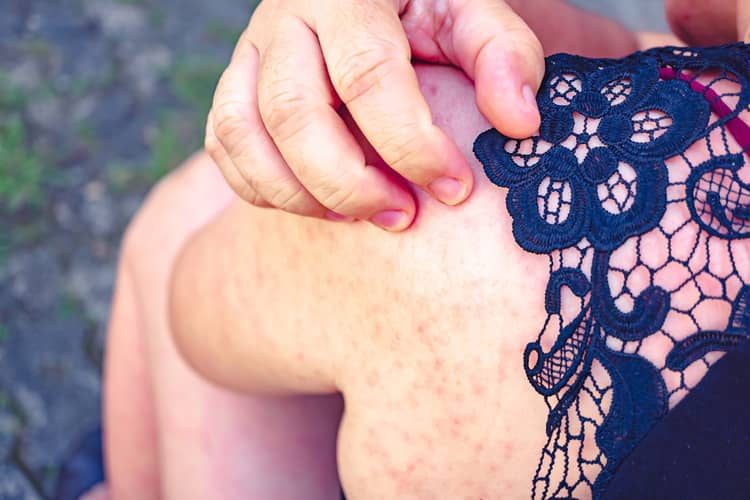
Chickenpox, measles or shingles during pregnancy. What are the risks?
Measles, chicken pox or shingles in pregnancy? Well-known infectious diseases that are primarily associated with childhood. With the exception of shingles, which is more characteristic of middle-aged and older people. Chickenpox in pregnancy poses a certain risk only for women who have not yet overcome it. It is an infectious disease that around 90% of the adult population will overcome by the age of 20. Shingles, on the other hand, is an infectious disease that occurs in a person who has already overcome chickenpox, but their reactivation occurred due to reinfection or weakened immunity. Measles is also an infectious disease that can be quite dangerous for pregnant women. However, thanks to systematic vaccination, their occurrence in our territory is very low. How risky are these diseases during pregnancy for the woman and the child?
For pregnant women, chicken pox or measles pose a risk, especially if they did not overcome these diseases before pregnancy. In the case of measles, the risk of their occurrence is lower, because a person in Slovakia is vaccinated against it as part of the basic vaccination and has effective antibodies in the body. Vaccination against chicken pox is only recommended and does not belong to the basic vaccines. Shingles or herpes zoster is a specific infectious disease, the cause of which is chickenpox, which a person has already overcome. However, after overcoming them, the virus itself does not completely disappear from the body and survives latently. Its reactivation can be caused by significantly weakened immunity, another disease, excessive stress or re-infection in an already immune person. Let's take a closer look at these infectious diseases in the text.
Chickenpox in pregnancy
Pregnant women often wonder if chickenpox is dangerous during pregnancy, especially if this risk arises immediately. For example, if the parents already have one child and they learn that the smallpox infection is spreading in the kindergarten. Is chickenpox really that dangerous for a pregnant woman?
Almost 90% of adults get over chickenpox by the age of 20. Most often in preschool or school period. It is therefore a relatively common " childhood disease ". In general, a child's organism copes with this highly contagious infectious disease better than an adult's. After overcoming it, life-long substance immunity is subsequently created.
Chickenpox (varicella) is transmitted through the air as a droplet infection, but also by direct contact, if an uninfected person comes into contact with a skin blister containing the virus. An infected person is most infectious 2 days before the appearance of skin blisters and also approximately 7 days after the appearance of rashes. The incubation period of the disease is from 6 to 23 days, on average around 14 to 17 days. Sowing takes about 5-7 days.
Chickenpox can cause serious complications during pregnancy, but the fact is that a complicated course occurs in a minimal number of cases. In its normal course, chickenpox does not pose a risk to the woman or the fetus. Doctors assure pregnant women that there is no need to panic when chickenpox is suspected, but at the same time, such a viral infection cannot be ignored. The course is usually uncomplicated, and chickenpox is a risk for a pregnant woman if other diseases are associated with weakened immunity.
If left untreated and a serious infection breaks out, chickenpox can damage the fetus, cause limb deformities, induce premature birth or cause the birth of a stillborn child. The virus can also cause a miscarriage. Chickenpox is the most dangerous for a pregnant woman during the first trimester or until approximately the 20th week of pregnancy. Also in the last days of pregnancy.
If a pregnant woman is infected with chickenpox in the period before giving birth or just after giving birth, it can cause the neonatal form of chickenpox in the newborn (so-called neonatal varicella). It is necessary to visit a doctor and determine appropriate treatment so that the baby's health condition is not complicated by the association of other diseases (e.g. pneumonia). During this period, the newborn's immunity is very fragile.

Symptoms of chickenpox and the course of the disease
Before a woman decides to attribute some of the following symptoms to chickenpox, it is advisable to find out whether she has already overcome this infectious disease. Ideally, if she does so before pregnancy. How to find out if I overcame smallpox in childhood? Such detection is carried out by a blood test for antibodies. It is therefore necessary to have a blood sample taken by your general practitioner. Blood analysis determines the amount of antibodies present in the body. If the amount of antibodies is low, a woman is recommended to be vaccinated against chicken pox before pregnancy.
In the first phase of the disease, an increased body temperature above 38 °C, fatigue or apathy appears. These initial symptoms do not necessarily appear at the beginning of the disease and can occur only after the onset of rashes - the second phase of the infection. In the second phase, seeding (efflorescence) begins on the face, neck, abdomen, back or in the area of the neck and hair part of the head. The blisters contain the virus itself, so direct contact is infectious. At first, the rashes are red, later watery, and finally they dry up and heal. They tend to itch irritatingly.
Treatment of chickenpox in pregnancy
During pregnancy, a mild course of chickenpox infection does not require special therapy. According to experts, chicken pox does not normally pose health risks for the mother and the fetus. Bed rest, sufficient fluid intake and immunity support (vitamins) are necessary. Antihistamines may be used or gamma globulin injection therapy is administered to support immunity. Liquid powder treatment is not recommended. To dry the blisters, it is recommended to use hypermanganese solution or special ointments, creams and gels. Always follow the recommendations of your doctor or pharmacist. A more serious course should be consulted with an infectious disease specialist.
Vaccination against chickenpox represents an effective prevention, which is the best way to protect against infection with this disease. Vaccination against smallpox in Slovakia is not one of the basic vaccinations (note that it is a voluntary vaccination) and is only among the recommended vaccinations. Vaccination is highly recommended for women who are planning to become pregnant and have not yet recovered from chickenpox. Thus, effective antibodies are created in the body as a response to infection with this viral disease. Unfortunately, vaccination is not recommended for women who are already pregnant, and they should protect themselves as much as possible against possible infection. In case of infection, other methodological treatment procedures are used.
Shingles in pregnancy
Shingles or herpes zoster is another of the group of viral-infectious diseases. It is often called " the second chicken pox ", because the causative agent of this disease is the varicella zoster virus. It is basically a secondary infection with this virus, which after the initial infection (by chicken pox) survives in the human body in a hidden form, while it does not show any negative symptoms thanks to a sufficient level of antibodies.
The risk occurs during its reactivation. Reactivation of shingles after chickenpox occurs in approximately 10 to 20% of the adult population. It usually occurs at the age of over 50, more often in the age category of 65+ or 85+ years. Reactivation of the virus can be triggered by various causes - significantly weakened immunity - immunosuppression (a very common phenomenon in pregnancy), other diseases (e.g. immune or oncological), excessive stress, anemia, malnutrition, older age, excessive physical exertion, chronic fatigue or post-operative condition. Based on certain stimuli and the state of health, the virus begins to multiply again and spreads to the nerve fibers.
The incubation period of the virus is 14 days. Similar to chickenpox, the virus is transmitted by droplets or by contact with blisters that are filled with the virus. Therefore, people who have not yet had chickenpox, or older people over 60, must be careful. After the blisters dry, the virus is no longer spread by direct contact. Blisters can take up to 30 days to dry up. On average, shingles lasts 14 to 21 days.
And is shingles in pregnancy a big risk? Based on studies and cases from practice, no direct effect of shingles on pregnancy, its course or fetal development has been demonstrated. Women who had shingles during pregnancy gave birth to a healthy child. In the age group of pregnant women, complications appear only rarely. The increased risk only concerns future mothers with indicated immunosuppression, where there are higher risks of complications or consequences after overcoming the disease. Shingles can pose a risk even in the first trimester and in the period just before childbirth. Then the baby can develop neonatal chickenpox or shingles can have a risk effect on the pregnancy and the fetus, similar to the case of chickenpox.

Symptoms of shingles and the course of the disease
It is also called the herpes virus, because it manifests itself as an unpleasant seeding in the form of concentrated boils - blisters. In the first days of infection, there is itching or skin pain in the form of stinging or burning. Subsequently, skin blisters appear, similar to chickenpox. Blisters tend to burst and ooze. The liquid is infected with the virus and can cause its spread. Gradually, the rashes dry up (approximately 7 to 14 days) and heal with scabs. Rashes must not be scratched because there is a risk of secondary infection.
Shingles is usually localized in the trunk (torso), chest, thighs, shoulders or groin area - genitals. The danger for the elderly is shingles in the ear or in the eye area. Among the indicators of shingles is also nausea, increased body temperature, pale skin and loss of appetite. Since skin rashes are painful, they can make movement, dressing or showering or other activities uncomfortable. Despite the course of the disease, it may seem that shingles and showering do not go together, showering is allowed. Of course, without significant scrubbing on the affected areas. Showering with lukewarm water is recommended.
Treatment of shingles
During treatment during pregnancy, it is necessary to prevent the virus from multiplying further. If shingles appears during pregnancy, the symptoms are suppressed by the administration of antivirals, which significantly shorten the treatment period. Different creams, ointments (zinc ointment) or gels can be used for rashes. A pharmacist or your doctor should be consulted about suitability. It is also necessary to support the immune system with suitable vitamin supplements when the herpes virus occurs.

Measles in pregnancy
It belongs to childhood diseases, which today are considered almost harmless. Measles most often occurs in children under 1 year of age. However, during pregnancy, measles can have a negative impact on pregnancy and fetal development. Similar to other infectious diseases (e.g. chickenpox). Measles is a risk for a pregnant woman especially in the first 4 months of pregnancy. Measles infection can cause damage to the fetus or cause termination of pregnancy - abortion. Defects related to deafness, blindness, clefts or cardiovascular diseases may appear after birth.
It is very reassuring that primary vaccination and revaccination against measles protect us in Slovakia. Thanks to this, the incidence of measles is relatively low today. If a person was infected with measles in childhood, he is guaranteed a lifelong presence of antibodies. A pregnant woman has the option of having a blood test performed to determine the level of antibodies against measles.
Like chicken pox, measles is manifested by the appearance of small red rashes on the body or face. Accompanying symptoms can be fever, fatigue, loss of appetite, loose stools and lethargy. During the treatment, the doctor determines the procedure. If a pregnant woman has been in contact with an infected person, the doctor may consider administering immunoglobin for a better immune response. Vaccination against measles during pregnancy is not recommended.

Smallpox, measles and shingles in pregnancy - experience
In discussions, women are most worried about the risk these infectious diseases pose to the fetus. In connection with measles, women mainly refer to effective vaccination. At the same time, collective vaccination and the low incidence of measles also play in favor of the low risk of infection. In the case of chickenpox, women often turn to others discussing how to find out if they have already overcome chickenpox. They recommend a blood test by a doctor. They also state that the greatest risk for a pregnant woman is in the first trimester and just before delivery, when there is the greatest chance that the child can be infected through the placenta. Women recommend vaccination even before the planned pregnancy. Shingles usually does not cause problems for women during pregnancy, but women recommend treatment of this condition after consultation with a doctor - an infectious disease specialist.
The most frequent questions - FAQ
Are you worried about these infectious diseases, such as chicken pox, shingles or measles? These diseases pose a danger mainly to pregnant women who have not overcome them before pregnancy. Effective vaccines are available against smallpox and measles, which represent proven protection. What is the course of the disease after infection with chickenpox or measles? How do you know if you've gotten over chicken pox? What is shingles ? You will find a lot of practical information in our article. At the same time, we will be very happy if you share with us your experiences with the occurrence of these diseases during pregnancy. Your advice can help many moms who are interested in this topic. Join the discussion under the article.
Can I get smallpox twice?
How to find out if I have overcome smallpox?
How long does shingles last?
Pridať komentár






